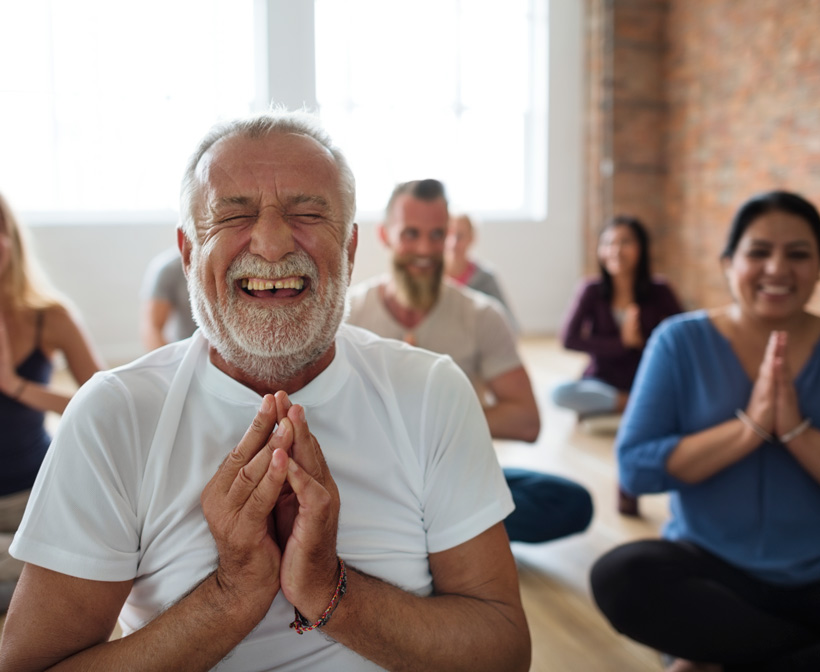Yoga for Happy Ageing
This class is especially designed for over 40’s to increase flexibility and strength in the body while having fun and meeting new people.
Yoga Classes for Happy Ageing
Yoga for Happy Ageing is a Hatha inspired yoga class for more mature yogis after a gentler practice! We start with a gentle warm up then move into standing, balancing and then seated poses. Finally, class is ended with a guided relaxation in savasana, a beautiful way to relax.
This class is suitable for all fitness levels. As you move through the yoga poses you will be demonstrated postures at different levels and can chose whatever level works best for you.

Where we hold Yoga for Happy Ageing Classes
This class is held in a new Community Center in the Providence Estate in South Ripley. The room is air conditioned and semi-private with curtains. Classes are capped at 10 people for a more personalised class atmosphere.
Group classes coming soon.
Upcoming Classes for Yoga for Happy Ageing
There are no upcoming classes. Private classes available on request. For all other classes please see below.
Benefits of Yoga for Happy Ageing
This yoga class will help to increase flexibility and strength while boosting energy levels. Being physically active also helps to maintain a healthy body weight. Yoga is good for your heart health and circulation. It is has also been proven to increase bone density, especially in the wrists and arms in older females. This is especially beneficial in the prevention of osteporosis. Yoga is known to increase balance and our proprioception. Lastly it will help to ease anxiety and stress while sharpening the mind through meditation practises. Overall yoga is amazing for your health especially as our bodies start to age.
More Information
Common questions about Yoga for Happy Ageing.
Can’t find your question? Check out our frequently asked questions or contact us
What age is this class suitable for?
This class is designed for over 40’s but welcome to anyone who feels they need a gentler practise to ease into a yoga practise.
I don’t have a yoga mat can I still attend?
Yes of course! Some yoga mats are provided if you do not have one of your own.
Is it normal to feel sore and have muscle pain after a yoga class?
Just like all new physical activities, if you’re new to yoga, your muscles may take a few sessions to adapt. The soreness and muscle pain usually resolves within 3 days and tends to occur after the first few sessions. Muscle or joint soreness that doesn’t resolve within this time that persists beyond a couple of days is not typical and may be worth seeing your GP or physio for an assessment.
Ahimsa is something that we are taught in yoga class, it means ‘non-harm’. It can be easy to push ourselves a little too far or compare ourselves to the person in the room who has a more advanced practise but when we practise with ‘ahimsa’ we are reminded to be respectful of our bodies and only push to our own boundaries and not further. Your teacher will encourage you to find that edge of growth yet cultivate a sense of calm and ease at the same time. When we practise like this it significantly reduces the risk of injury.
What do I wear to a yoga class?
Active clothing wear or any clothing that is comfortable and easy to move and stretch in.
I have a medical condition. Is it ok to do yoga and are there any poses I should avoid in my condition?
Yoga can have a deep healing effect for many medical conditions. It can also help manage symptoms of many health challenges. We strongly recommend you let our teacher know of any medical conditions so that she can show you how to modify/ vary poses to perform them safely.
For example if you have high blood pressure it is best not to dip your head lower than your heart, therefore inversions are not advisable. A variation of this would be to have your legs up the wall. In general before starting a practise it is a good idea to check with your doctor first if you have any health challenges. Then proceed with caution and listen to your body and your breath. If you are starting to hold your breath it may be best to slow down a little and respect your body. If you ever feel faint, dizzy or experience rapid breathing, stop and rest.
Yoga teachers have basic training in anatomy and physiology, however are not doctors and cannot give you specific medical advice. If in doubt we encourage you to consult your GP or specialist about doing yoga with your current condition.
CREATE A HEALTHY LIFE WITH YOGA
“All that we are is the result of what we have thought. The mind is everything. What we think we become.” Buddha
